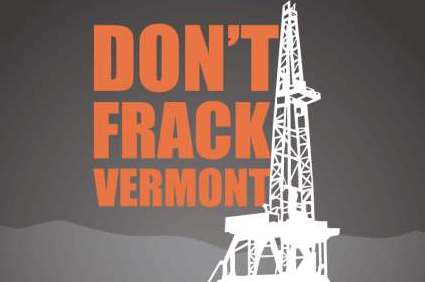MEDIA RELEASE
For Immediate Release: May 4, 2012
Legislature gives final passage to first-in-the-nation fracking ban
The Vermont House of Representatives voted 103-36 today to give final passage to legislation that will make Vermont the first state in the nation to ban the practice of hydraulic fracturing for natural gas.
“The Vermont Legislature deserves tremendous praise for having the courage to stand up to all of the lobbying, the full page ads and the legal threats of the oil and gas industry,” said Paul Burns, executive director of the Vermont Public Interest Research Group. “This is a shot that will be heard, if not around the world then at least around the country.”
Fracking is a method of extracting natural gas from deep in the ground by injecting a mixture of water, sand and chemicals under high pressure into dense rock formations such as shale, in order to crack the rock and release the gas. While the basic technology has been in use for decades, only much more recently has the industry developed the capacity to drill at depth horizontally within the rock formation for thousands of additional feet.
This new drilling technique has allowed the gas industry to reach large reserves that were previously considered uneconomical, particularly in shale formations. But unlike traditional vertical fracking, horizontal fracking requires massive amounts of water and potentially toxic chemicals. Enormous holding ponds or tanks are also needed to store the chemically contaminated waste water that comes back up the hole after wells have been fractured.
“Fracking has caused enormous problems with underground water contamination and aboveground waste disposal – entire streams have been destroyed,” said noted author and environmentalist, Bill McKibben. “A ban on this process makes sense, if for no other reason than it will keep the oil industry from pumping lobbying dollars into the state three years hence.”
McKibben was referring to an alternative proposal initially backed by the House, which would have established a three-year moratorium on fracking.
“Vermonters were able to see through the smokescreen put out by the gas industry,” said VPIRG organizer, Leah Marsters. “They understand the threat that fracking poses to public health, as well as our air, land and water,” she added.
According to a minority staff report released last year by the U.S. House of Representatives Committee on Energy and Commerce, more than 650 commonly used fracking products contain chemicals that are “known or possible human carcinogens, regulated under the Safe Drinking Water Act, or listed as hazardous air pollutants.”
No gas fracking is currently taking place in Vermont. Natural gas deposits are thought to exist mainly in the northwestern part of the state. The same shale formation that has previously supported commercially viable fracking operations in Quebec extends south along Lake Champlain in Vermont.
“VPIRG recognizes in particular the leadership of Senator Ginny Lyons, Chair of the Senate’s Committee on Natural Resources and Energy, on this issue,” said Burns. “She knew that it was critical that Vermont implement a ban on fracking before the industry is able to establish a corrupting toehold in the state.”
The Senate voted overwhelmingly for a ban on fracking after the House passed a moratorium. This required a Committee of Conference to negotiate the differences. The Senate’s more protective approach won out.
Other organizations joining VPIRG in pressing the Legislature to act on fracking this year included the Vermont Natural Resources Council, 350 Vermont, the Vermont Sierra Club and Democracy for America. Representatives of the Catskill Mountainkeepers in New York, and the Natural Resources Defense Council also provided expert testimony before Senator Lyons’ committee this session.
“No one is suggesting that Vermont is likely to be the home of bountiful natural gas supplies,” said Burns. “But sometimes all it takes is one state to have the courage to lead in order to change the direction of the country. And if you look at how hard the industry fought this, you begin to see that they believe that’s true too.”
###

